Gibbs Reflective Cycle Application: Nursing Incident Analysis Report
VerifiedAdded on 2023/04/21
|12
|3225
|174
Report
AI Summary
This report presents a reflective analysis of a nursing incident encountered during a community-based nursing placement, employing the Gibbs Reflective Cycle. The incident involved an elderly patient with dementia and a pressure ulcer, highlighting a lapse in care when a nurse failed to provide ne...
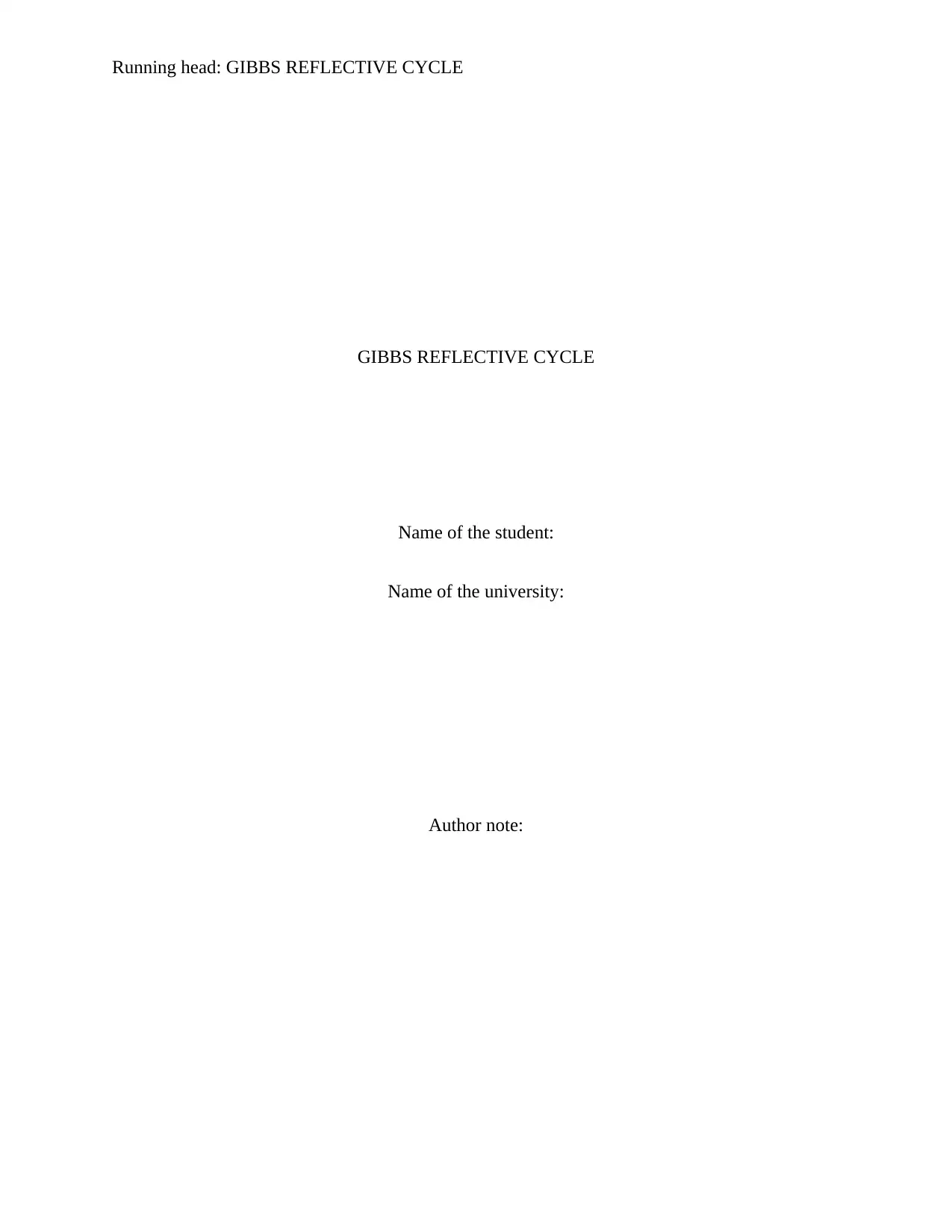
Running head: GIBBS REFLECTIVE CYCLE
GIBBS REFLECTIVE CYCLE
Name of the student:
Name of the university:
Author note:
GIBBS REFLECTIVE CYCLE
Name of the student:
Name of the university:
Author note:
Secure Best Marks with AI Grader
Need help grading? Try our AI Grader for instant feedback on your assignments.
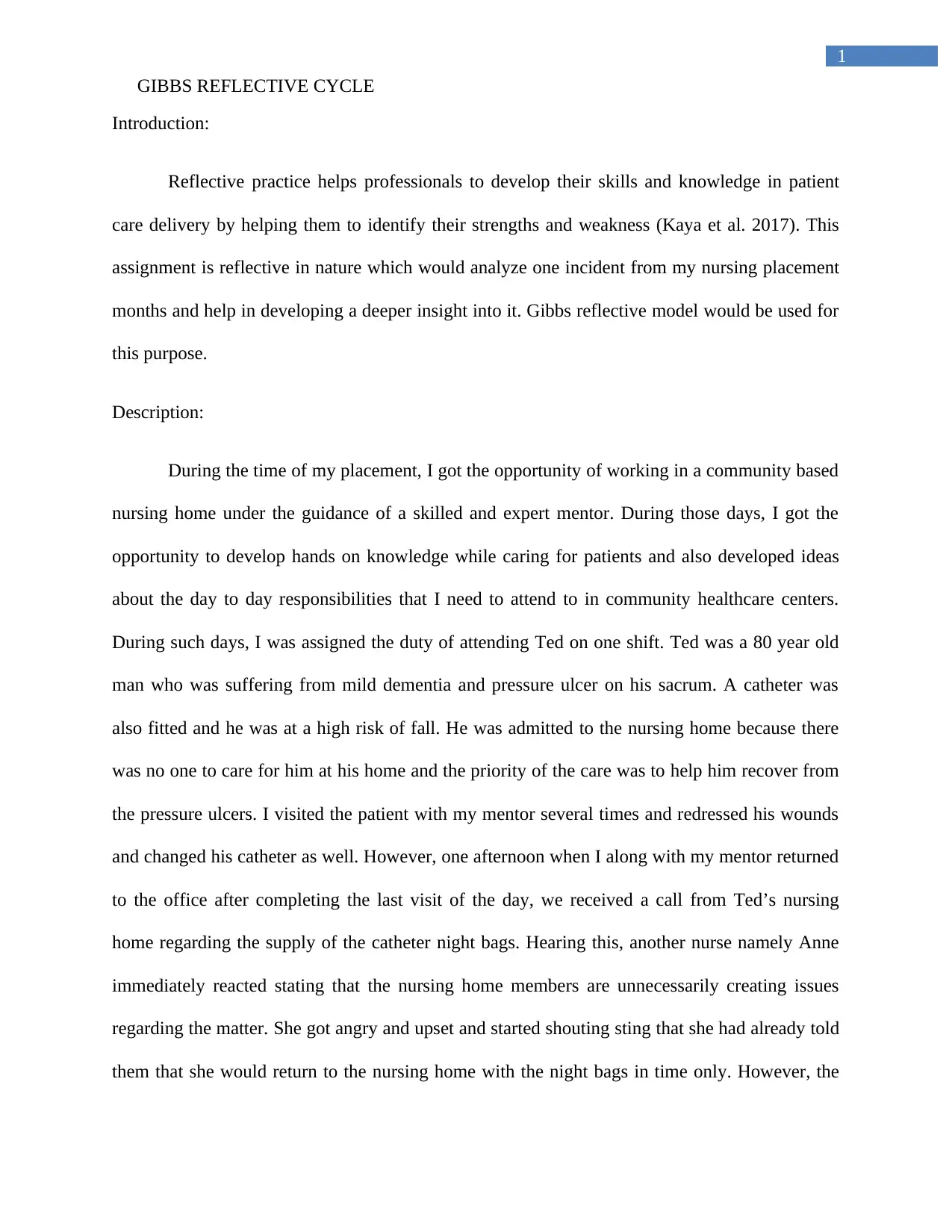
1
GIBBS REFLECTIVE CYCLE
Introduction:
Reflective practice helps professionals to develop their skills and knowledge in patient
care delivery by helping them to identify their strengths and weakness (Kaya et al. 2017). This
assignment is reflective in nature which would analyze one incident from my nursing placement
months and help in developing a deeper insight into it. Gibbs reflective model would be used for
this purpose.
Description:
During the time of my placement, I got the opportunity of working in a community based
nursing home under the guidance of a skilled and expert mentor. During those days, I got the
opportunity to develop hands on knowledge while caring for patients and also developed ideas
about the day to day responsibilities that I need to attend to in community healthcare centers.
During such days, I was assigned the duty of attending Ted on one shift. Ted was a 80 year old
man who was suffering from mild dementia and pressure ulcer on his sacrum. A catheter was
also fitted and he was at a high risk of fall. He was admitted to the nursing home because there
was no one to care for him at his home and the priority of the care was to help him recover from
the pressure ulcers. I visited the patient with my mentor several times and redressed his wounds
and changed his catheter as well. However, one afternoon when I along with my mentor returned
to the office after completing the last visit of the day, we received a call from Ted’s nursing
home regarding the supply of the catheter night bags. Hearing this, another nurse namely Anne
immediately reacted stating that the nursing home members are unnecessarily creating issues
regarding the matter. She got angry and upset and started shouting sting that she had already told
them that she would return to the nursing home with the night bags in time only. However, the
GIBBS REFLECTIVE CYCLE
Introduction:
Reflective practice helps professionals to develop their skills and knowledge in patient
care delivery by helping them to identify their strengths and weakness (Kaya et al. 2017). This
assignment is reflective in nature which would analyze one incident from my nursing placement
months and help in developing a deeper insight into it. Gibbs reflective model would be used for
this purpose.
Description:
During the time of my placement, I got the opportunity of working in a community based
nursing home under the guidance of a skilled and expert mentor. During those days, I got the
opportunity to develop hands on knowledge while caring for patients and also developed ideas
about the day to day responsibilities that I need to attend to in community healthcare centers.
During such days, I was assigned the duty of attending Ted on one shift. Ted was a 80 year old
man who was suffering from mild dementia and pressure ulcer on his sacrum. A catheter was
also fitted and he was at a high risk of fall. He was admitted to the nursing home because there
was no one to care for him at his home and the priority of the care was to help him recover from
the pressure ulcers. I visited the patient with my mentor several times and redressed his wounds
and changed his catheter as well. However, one afternoon when I along with my mentor returned
to the office after completing the last visit of the day, we received a call from Ted’s nursing
home regarding the supply of the catheter night bags. Hearing this, another nurse namely Anne
immediately reacted stating that the nursing home members are unnecessarily creating issues
regarding the matter. She got angry and upset and started shouting sting that she had already told
them that she would return to the nursing home with the night bags in time only. However, the
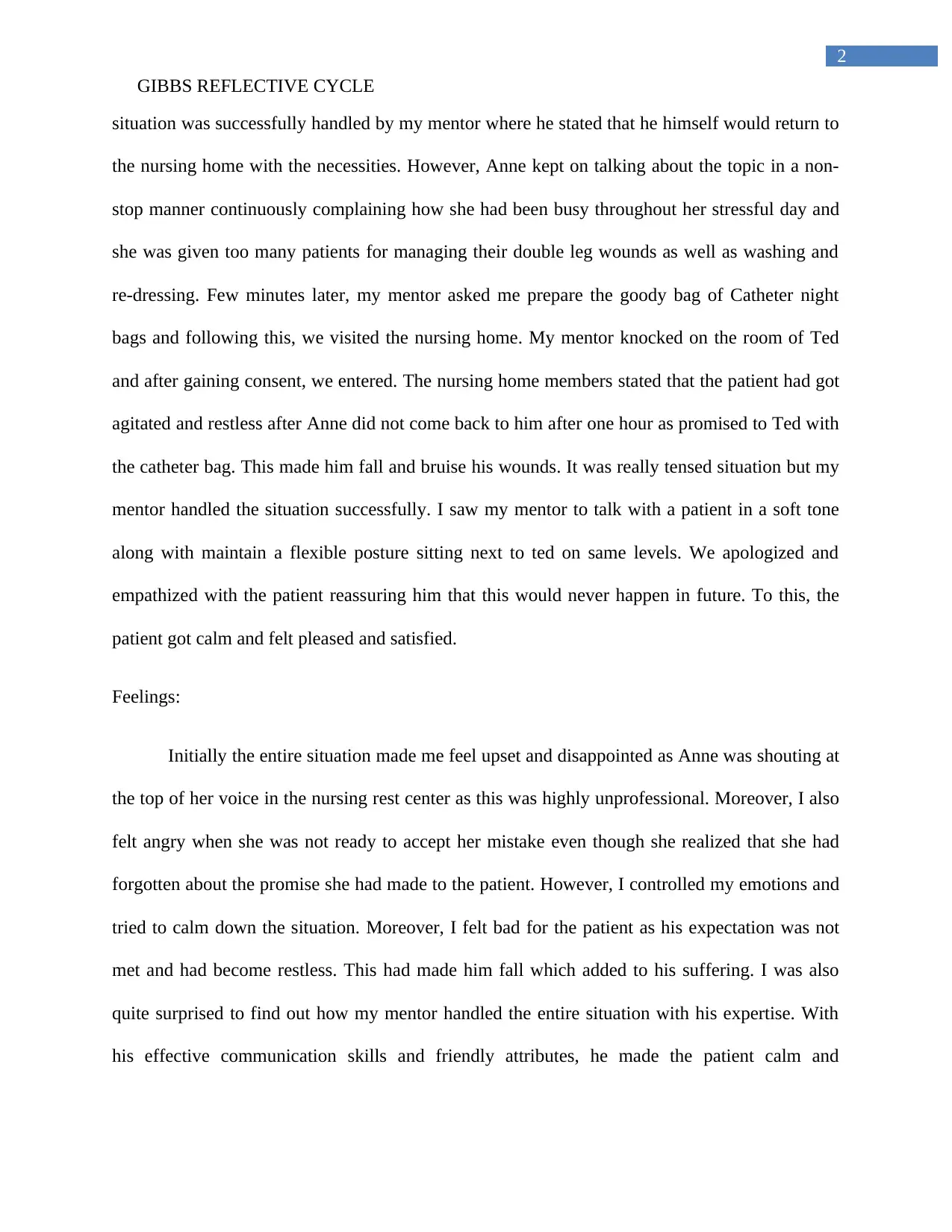
2
GIBBS REFLECTIVE CYCLE
situation was successfully handled by my mentor where he stated that he himself would return to
the nursing home with the necessities. However, Anne kept on talking about the topic in a non-
stop manner continuously complaining how she had been busy throughout her stressful day and
she was given too many patients for managing their double leg wounds as well as washing and
re-dressing. Few minutes later, my mentor asked me prepare the goody bag of Catheter night
bags and following this, we visited the nursing home. My mentor knocked on the room of Ted
and after gaining consent, we entered. The nursing home members stated that the patient had got
agitated and restless after Anne did not come back to him after one hour as promised to Ted with
the catheter bag. This made him fall and bruise his wounds. It was really tensed situation but my
mentor handled the situation successfully. I saw my mentor to talk with a patient in a soft tone
along with maintain a flexible posture sitting next to ted on same levels. We apologized and
empathized with the patient reassuring him that this would never happen in future. To this, the
patient got calm and felt pleased and satisfied.
Feelings:
Initially the entire situation made me feel upset and disappointed as Anne was shouting at
the top of her voice in the nursing rest center as this was highly unprofessional. Moreover, I also
felt angry when she was not ready to accept her mistake even though she realized that she had
forgotten about the promise she had made to the patient. However, I controlled my emotions and
tried to calm down the situation. Moreover, I felt bad for the patient as his expectation was not
met and had become restless. This had made him fall which added to his suffering. I was also
quite surprised to find out how my mentor handled the entire situation with his expertise. With
his effective communication skills and friendly attributes, he made the patient calm and
GIBBS REFLECTIVE CYCLE
situation was successfully handled by my mentor where he stated that he himself would return to
the nursing home with the necessities. However, Anne kept on talking about the topic in a non-
stop manner continuously complaining how she had been busy throughout her stressful day and
she was given too many patients for managing their double leg wounds as well as washing and
re-dressing. Few minutes later, my mentor asked me prepare the goody bag of Catheter night
bags and following this, we visited the nursing home. My mentor knocked on the room of Ted
and after gaining consent, we entered. The nursing home members stated that the patient had got
agitated and restless after Anne did not come back to him after one hour as promised to Ted with
the catheter bag. This made him fall and bruise his wounds. It was really tensed situation but my
mentor handled the situation successfully. I saw my mentor to talk with a patient in a soft tone
along with maintain a flexible posture sitting next to ted on same levels. We apologized and
empathized with the patient reassuring him that this would never happen in future. To this, the
patient got calm and felt pleased and satisfied.
Feelings:
Initially the entire situation made me feel upset and disappointed as Anne was shouting at
the top of her voice in the nursing rest center as this was highly unprofessional. Moreover, I also
felt angry when she was not ready to accept her mistake even though she realized that she had
forgotten about the promise she had made to the patient. However, I controlled my emotions and
tried to calm down the situation. Moreover, I felt bad for the patient as his expectation was not
met and had become restless. This had made him fall which added to his suffering. I was also
quite surprised to find out how my mentor handled the entire situation with his expertise. With
his effective communication skills and friendly attributes, he made the patient calm and
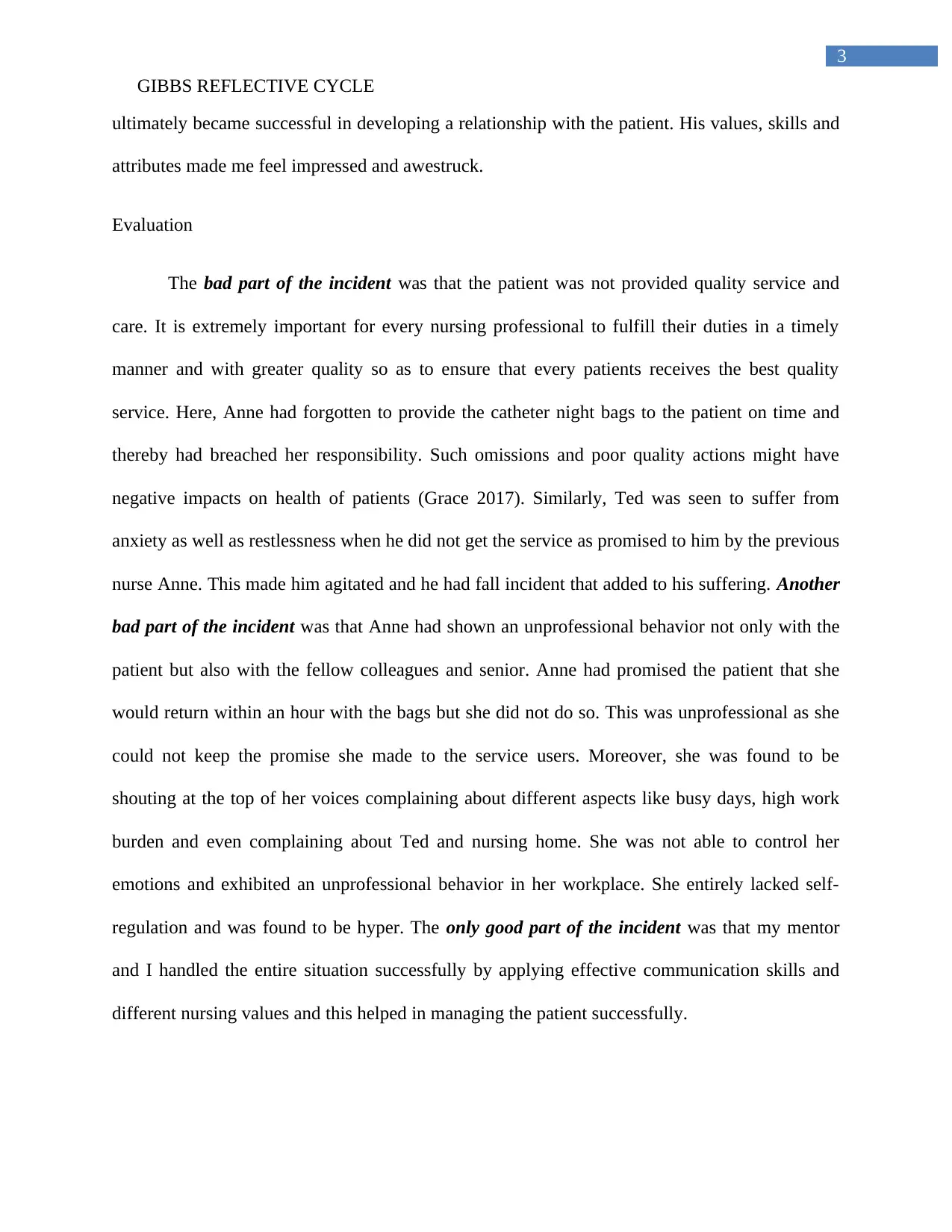
3
GIBBS REFLECTIVE CYCLE
ultimately became successful in developing a relationship with the patient. His values, skills and
attributes made me feel impressed and awestruck.
Evaluation
The bad part of the incident was that the patient was not provided quality service and
care. It is extremely important for every nursing professional to fulfill their duties in a timely
manner and with greater quality so as to ensure that every patients receives the best quality
service. Here, Anne had forgotten to provide the catheter night bags to the patient on time and
thereby had breached her responsibility. Such omissions and poor quality actions might have
negative impacts on health of patients (Grace 2017). Similarly, Ted was seen to suffer from
anxiety as well as restlessness when he did not get the service as promised to him by the previous
nurse Anne. This made him agitated and he had fall incident that added to his suffering. Another
bad part of the incident was that Anne had shown an unprofessional behavior not only with the
patient but also with the fellow colleagues and senior. Anne had promised the patient that she
would return within an hour with the bags but she did not do so. This was unprofessional as she
could not keep the promise she made to the service users. Moreover, she was found to be
shouting at the top of her voices complaining about different aspects like busy days, high work
burden and even complaining about Ted and nursing home. She was not able to control her
emotions and exhibited an unprofessional behavior in her workplace. She entirely lacked self-
regulation and was found to be hyper. The only good part of the incident was that my mentor
and I handled the entire situation successfully by applying effective communication skills and
different nursing values and this helped in managing the patient successfully.
GIBBS REFLECTIVE CYCLE
ultimately became successful in developing a relationship with the patient. His values, skills and
attributes made me feel impressed and awestruck.
Evaluation
The bad part of the incident was that the patient was not provided quality service and
care. It is extremely important for every nursing professional to fulfill their duties in a timely
manner and with greater quality so as to ensure that every patients receives the best quality
service. Here, Anne had forgotten to provide the catheter night bags to the patient on time and
thereby had breached her responsibility. Such omissions and poor quality actions might have
negative impacts on health of patients (Grace 2017). Similarly, Ted was seen to suffer from
anxiety as well as restlessness when he did not get the service as promised to him by the previous
nurse Anne. This made him agitated and he had fall incident that added to his suffering. Another
bad part of the incident was that Anne had shown an unprofessional behavior not only with the
patient but also with the fellow colleagues and senior. Anne had promised the patient that she
would return within an hour with the bags but she did not do so. This was unprofessional as she
could not keep the promise she made to the service users. Moreover, she was found to be
shouting at the top of her voices complaining about different aspects like busy days, high work
burden and even complaining about Ted and nursing home. She was not able to control her
emotions and exhibited an unprofessional behavior in her workplace. She entirely lacked self-
regulation and was found to be hyper. The only good part of the incident was that my mentor
and I handled the entire situation successfully by applying effective communication skills and
different nursing values and this helped in managing the patient successfully.
Secure Best Marks with AI Grader
Need help grading? Try our AI Grader for instant feedback on your assignments.
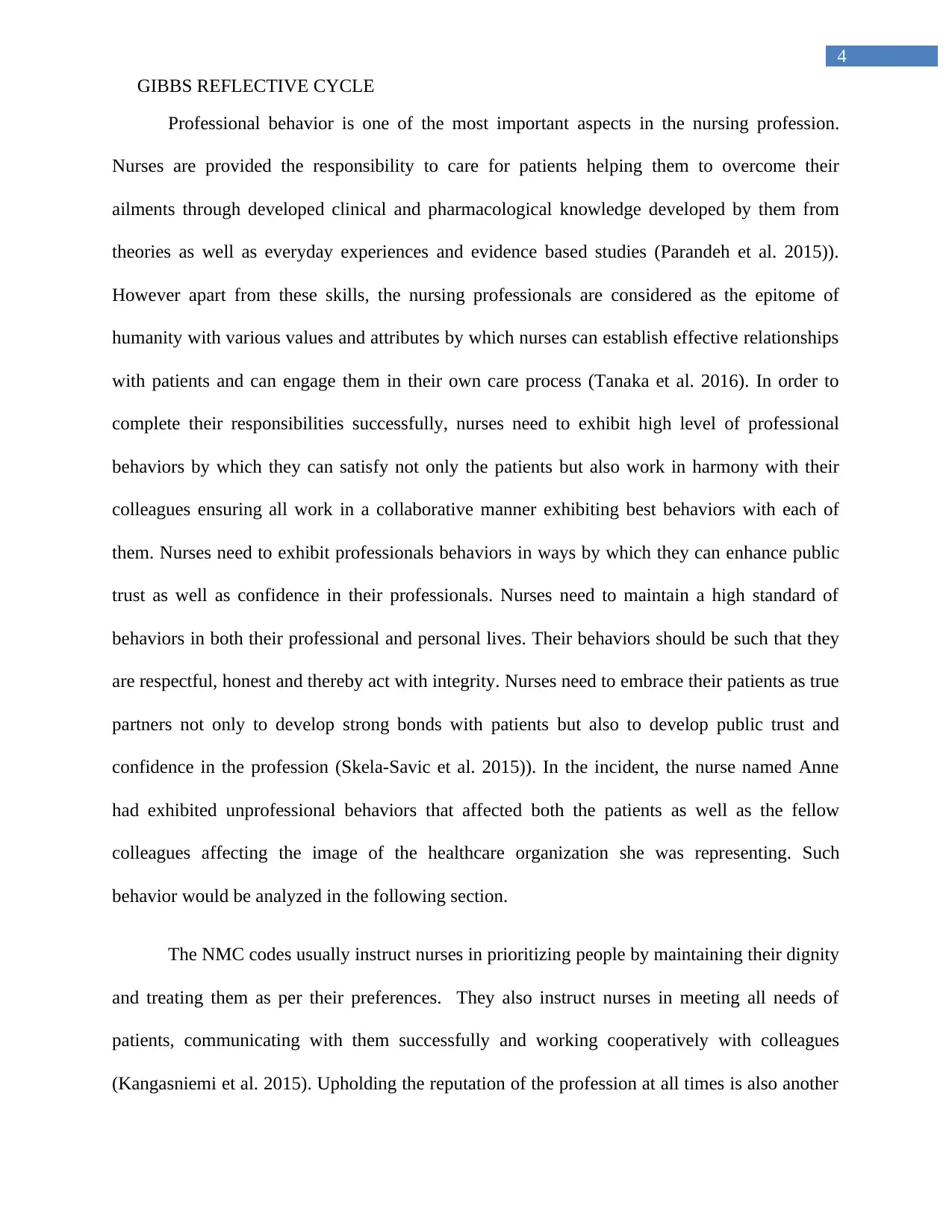
4
GIBBS REFLECTIVE CYCLE
Professional behavior is one of the most important aspects in the nursing profession.
Nurses are provided the responsibility to care for patients helping them to overcome their
ailments through developed clinical and pharmacological knowledge developed by them from
theories as well as everyday experiences and evidence based studies (Parandeh et al. 2015)).
However apart from these skills, the nursing professionals are considered as the epitome of
humanity with various values and attributes by which nurses can establish effective relationships
with patients and can engage them in their own care process (Tanaka et al. 2016). In order to
complete their responsibilities successfully, nurses need to exhibit high level of professional
behaviors by which they can satisfy not only the patients but also work in harmony with their
colleagues ensuring all work in a collaborative manner exhibiting best behaviors with each of
them. Nurses need to exhibit professionals behaviors in ways by which they can enhance public
trust as well as confidence in their professionals. Nurses need to maintain a high standard of
behaviors in both their professional and personal lives. Their behaviors should be such that they
are respectful, honest and thereby act with integrity. Nurses need to embrace their patients as true
partners not only to develop strong bonds with patients but also to develop public trust and
confidence in the profession (Skela-Savic et al. 2015)). In the incident, the nurse named Anne
had exhibited unprofessional behaviors that affected both the patients as well as the fellow
colleagues affecting the image of the healthcare organization she was representing. Such
behavior would be analyzed in the following section.
The NMC codes usually instruct nurses in prioritizing people by maintaining their dignity
and treating them as per their preferences. They also instruct nurses in meeting all needs of
patients, communicating with them successfully and working cooperatively with colleagues
(Kangasniemi et al. 2015). Upholding the reputation of the profession at all times is also another
GIBBS REFLECTIVE CYCLE
Professional behavior is one of the most important aspects in the nursing profession.
Nurses are provided the responsibility to care for patients helping them to overcome their
ailments through developed clinical and pharmacological knowledge developed by them from
theories as well as everyday experiences and evidence based studies (Parandeh et al. 2015)).
However apart from these skills, the nursing professionals are considered as the epitome of
humanity with various values and attributes by which nurses can establish effective relationships
with patients and can engage them in their own care process (Tanaka et al. 2016). In order to
complete their responsibilities successfully, nurses need to exhibit high level of professional
behaviors by which they can satisfy not only the patients but also work in harmony with their
colleagues ensuring all work in a collaborative manner exhibiting best behaviors with each of
them. Nurses need to exhibit professionals behaviors in ways by which they can enhance public
trust as well as confidence in their professionals. Nurses need to maintain a high standard of
behaviors in both their professional and personal lives. Their behaviors should be such that they
are respectful, honest and thereby act with integrity. Nurses need to embrace their patients as true
partners not only to develop strong bonds with patients but also to develop public trust and
confidence in the profession (Skela-Savic et al. 2015)). In the incident, the nurse named Anne
had exhibited unprofessional behaviors that affected both the patients as well as the fellow
colleagues affecting the image of the healthcare organization she was representing. Such
behavior would be analyzed in the following section.
The NMC codes usually instruct nurses in prioritizing people by maintaining their dignity
and treating them as per their preferences. They also instruct nurses in meeting all needs of
patients, communicating with them successfully and working cooperatively with colleagues
(Kangasniemi et al. 2015). Upholding the reputation of the profession at all times is also another
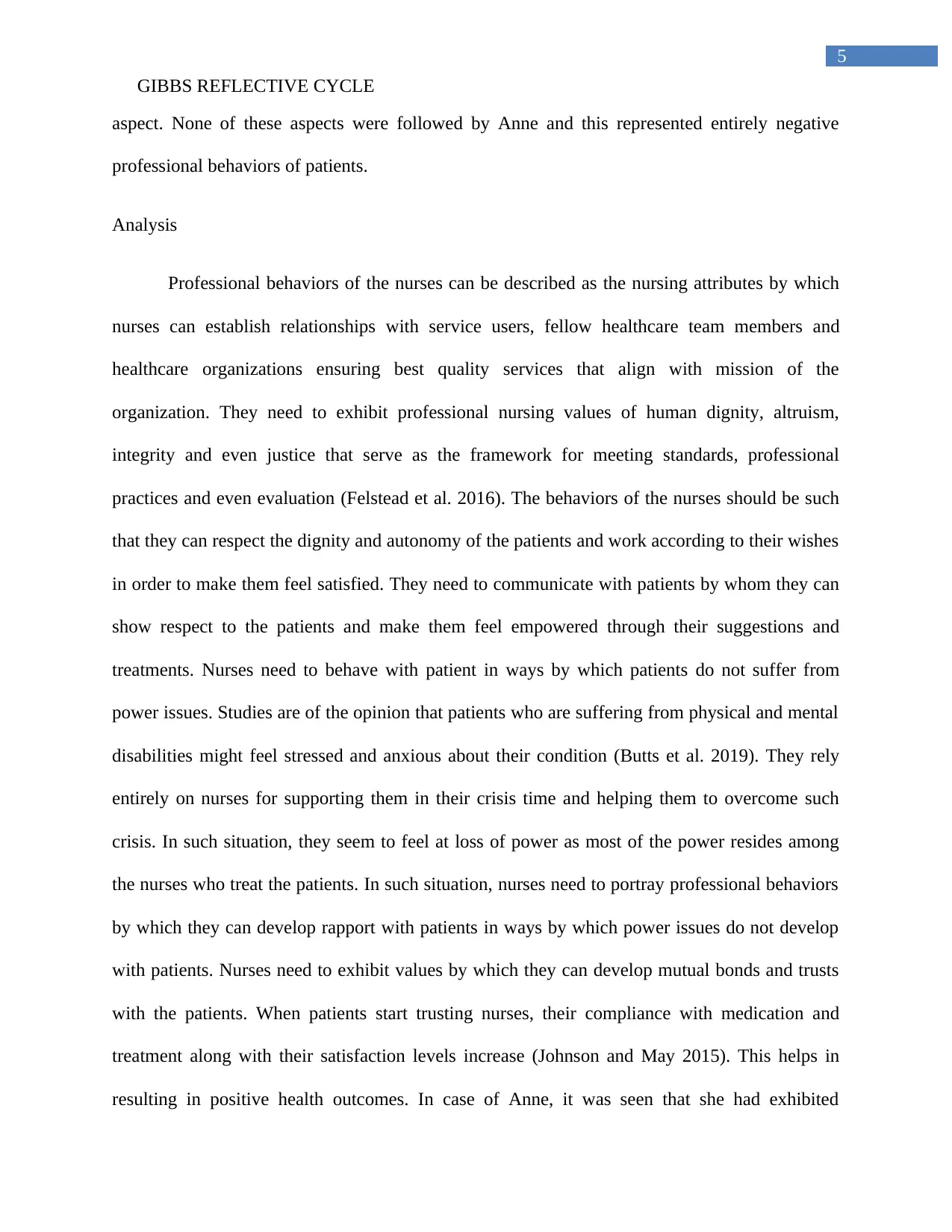
5
GIBBS REFLECTIVE CYCLE
aspect. None of these aspects were followed by Anne and this represented entirely negative
professional behaviors of patients.
Analysis
Professional behaviors of the nurses can be described as the nursing attributes by which
nurses can establish relationships with service users, fellow healthcare team members and
healthcare organizations ensuring best quality services that align with mission of the
organization. They need to exhibit professional nursing values of human dignity, altruism,
integrity and even justice that serve as the framework for meeting standards, professional
practices and even evaluation (Felstead et al. 2016). The behaviors of the nurses should be such
that they can respect the dignity and autonomy of the patients and work according to their wishes
in order to make them feel satisfied. They need to communicate with patients by whom they can
show respect to the patients and make them feel empowered through their suggestions and
treatments. Nurses need to behave with patient in ways by which patients do not suffer from
power issues. Studies are of the opinion that patients who are suffering from physical and mental
disabilities might feel stressed and anxious about their condition (Butts et al. 2019). They rely
entirely on nurses for supporting them in their crisis time and helping them to overcome such
crisis. In such situation, they seem to feel at loss of power as most of the power resides among
the nurses who treat the patients. In such situation, nurses need to portray professional behaviors
by which they can develop rapport with patients in ways by which power issues do not develop
with patients. Nurses need to exhibit values by which they can develop mutual bonds and trusts
with the patients. When patients start trusting nurses, their compliance with medication and
treatment along with their satisfaction levels increase (Johnson and May 2015). This helps in
resulting in positive health outcomes. In case of Anne, it was seen that she had exhibited
GIBBS REFLECTIVE CYCLE
aspect. None of these aspects were followed by Anne and this represented entirely negative
professional behaviors of patients.
Analysis
Professional behaviors of the nurses can be described as the nursing attributes by which
nurses can establish relationships with service users, fellow healthcare team members and
healthcare organizations ensuring best quality services that align with mission of the
organization. They need to exhibit professional nursing values of human dignity, altruism,
integrity and even justice that serve as the framework for meeting standards, professional
practices and even evaluation (Felstead et al. 2016). The behaviors of the nurses should be such
that they can respect the dignity and autonomy of the patients and work according to their wishes
in order to make them feel satisfied. They need to communicate with patients by whom they can
show respect to the patients and make them feel empowered through their suggestions and
treatments. Nurses need to behave with patient in ways by which patients do not suffer from
power issues. Studies are of the opinion that patients who are suffering from physical and mental
disabilities might feel stressed and anxious about their condition (Butts et al. 2019). They rely
entirely on nurses for supporting them in their crisis time and helping them to overcome such
crisis. In such situation, they seem to feel at loss of power as most of the power resides among
the nurses who treat the patients. In such situation, nurses need to portray professional behaviors
by which they can develop rapport with patients in ways by which power issues do not develop
with patients. Nurses need to exhibit values by which they can develop mutual bonds and trusts
with the patients. When patients start trusting nurses, their compliance with medication and
treatment along with their satisfaction levels increase (Johnson and May 2015). This helps in
resulting in positive health outcomes. In case of Anne, it was seen that she had exhibited
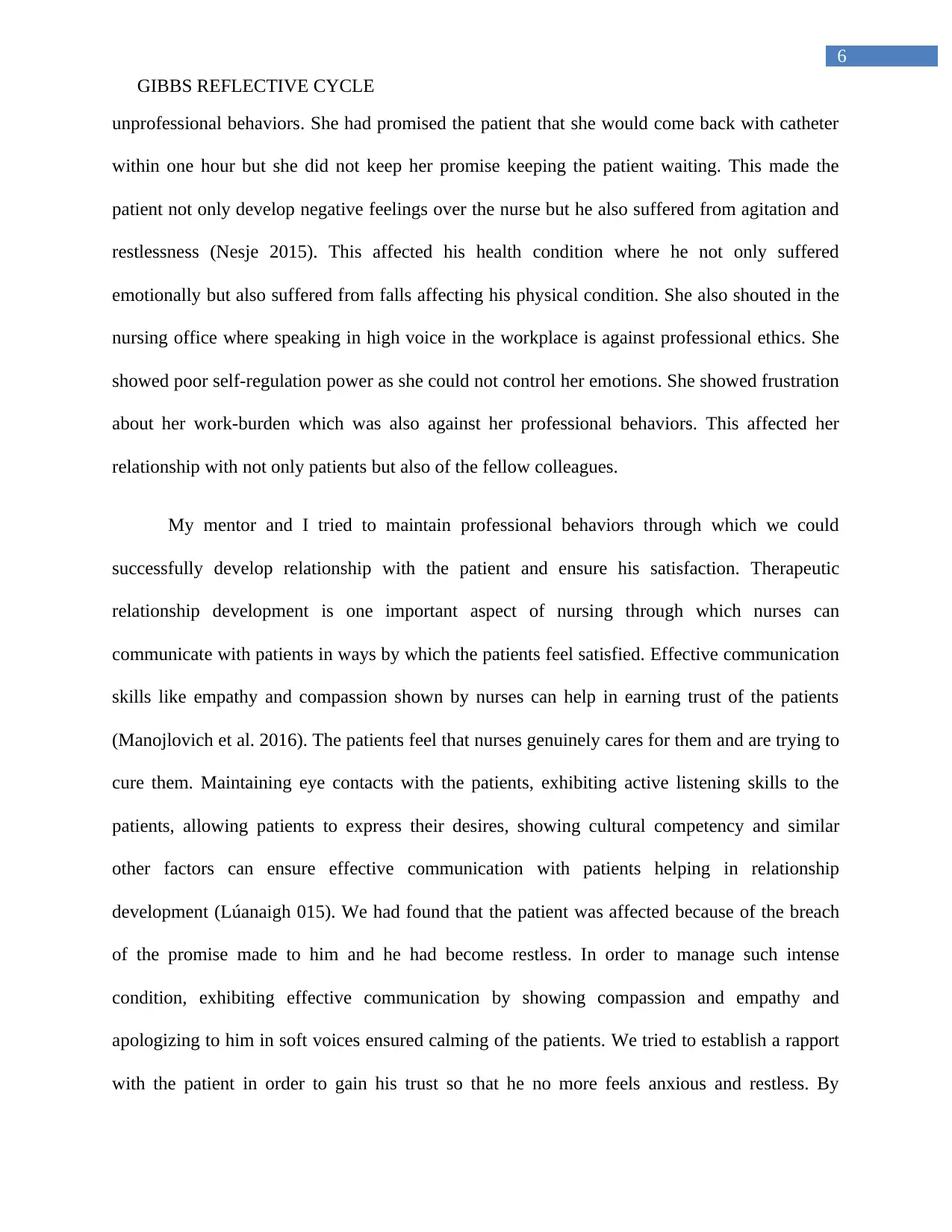
6
GIBBS REFLECTIVE CYCLE
unprofessional behaviors. She had promised the patient that she would come back with catheter
within one hour but she did not keep her promise keeping the patient waiting. This made the
patient not only develop negative feelings over the nurse but he also suffered from agitation and
restlessness (Nesje 2015). This affected his health condition where he not only suffered
emotionally but also suffered from falls affecting his physical condition. She also shouted in the
nursing office where speaking in high voice in the workplace is against professional ethics. She
showed poor self-regulation power as she could not control her emotions. She showed frustration
about her work-burden which was also against her professional behaviors. This affected her
relationship with not only patients but also of the fellow colleagues.
My mentor and I tried to maintain professional behaviors through which we could
successfully develop relationship with the patient and ensure his satisfaction. Therapeutic
relationship development is one important aspect of nursing through which nurses can
communicate with patients in ways by which the patients feel satisfied. Effective communication
skills like empathy and compassion shown by nurses can help in earning trust of the patients
(Manojlovich et al. 2016). The patients feel that nurses genuinely cares for them and are trying to
cure them. Maintaining eye contacts with the patients, exhibiting active listening skills to the
patients, allowing patients to express their desires, showing cultural competency and similar
other factors can ensure effective communication with patients helping in relationship
development (Lúanaigh 015). We had found that the patient was affected because of the breach
of the promise made to him and he had become restless. In order to manage such intense
condition, exhibiting effective communication by showing compassion and empathy and
apologizing to him in soft voices ensured calming of the patients. We tried to establish a rapport
with the patient in order to gain his trust so that he no more feels anxious and restless. By
GIBBS REFLECTIVE CYCLE
unprofessional behaviors. She had promised the patient that she would come back with catheter
within one hour but she did not keep her promise keeping the patient waiting. This made the
patient not only develop negative feelings over the nurse but he also suffered from agitation and
restlessness (Nesje 2015). This affected his health condition where he not only suffered
emotionally but also suffered from falls affecting his physical condition. She also shouted in the
nursing office where speaking in high voice in the workplace is against professional ethics. She
showed poor self-regulation power as she could not control her emotions. She showed frustration
about her work-burden which was also against her professional behaviors. This affected her
relationship with not only patients but also of the fellow colleagues.
My mentor and I tried to maintain professional behaviors through which we could
successfully develop relationship with the patient and ensure his satisfaction. Therapeutic
relationship development is one important aspect of nursing through which nurses can
communicate with patients in ways by which the patients feel satisfied. Effective communication
skills like empathy and compassion shown by nurses can help in earning trust of the patients
(Manojlovich et al. 2016). The patients feel that nurses genuinely cares for them and are trying to
cure them. Maintaining eye contacts with the patients, exhibiting active listening skills to the
patients, allowing patients to express their desires, showing cultural competency and similar
other factors can ensure effective communication with patients helping in relationship
development (Lúanaigh 015). We had found that the patient was affected because of the breach
of the promise made to him and he had become restless. In order to manage such intense
condition, exhibiting effective communication by showing compassion and empathy and
apologizing to him in soft voices ensured calming of the patients. We tried to establish a rapport
with the patient in order to gain his trust so that he no more feels anxious and restless. By
Paraphrase This Document
Need a fresh take? Get an instant paraphrase of this document with our AI Paraphraser
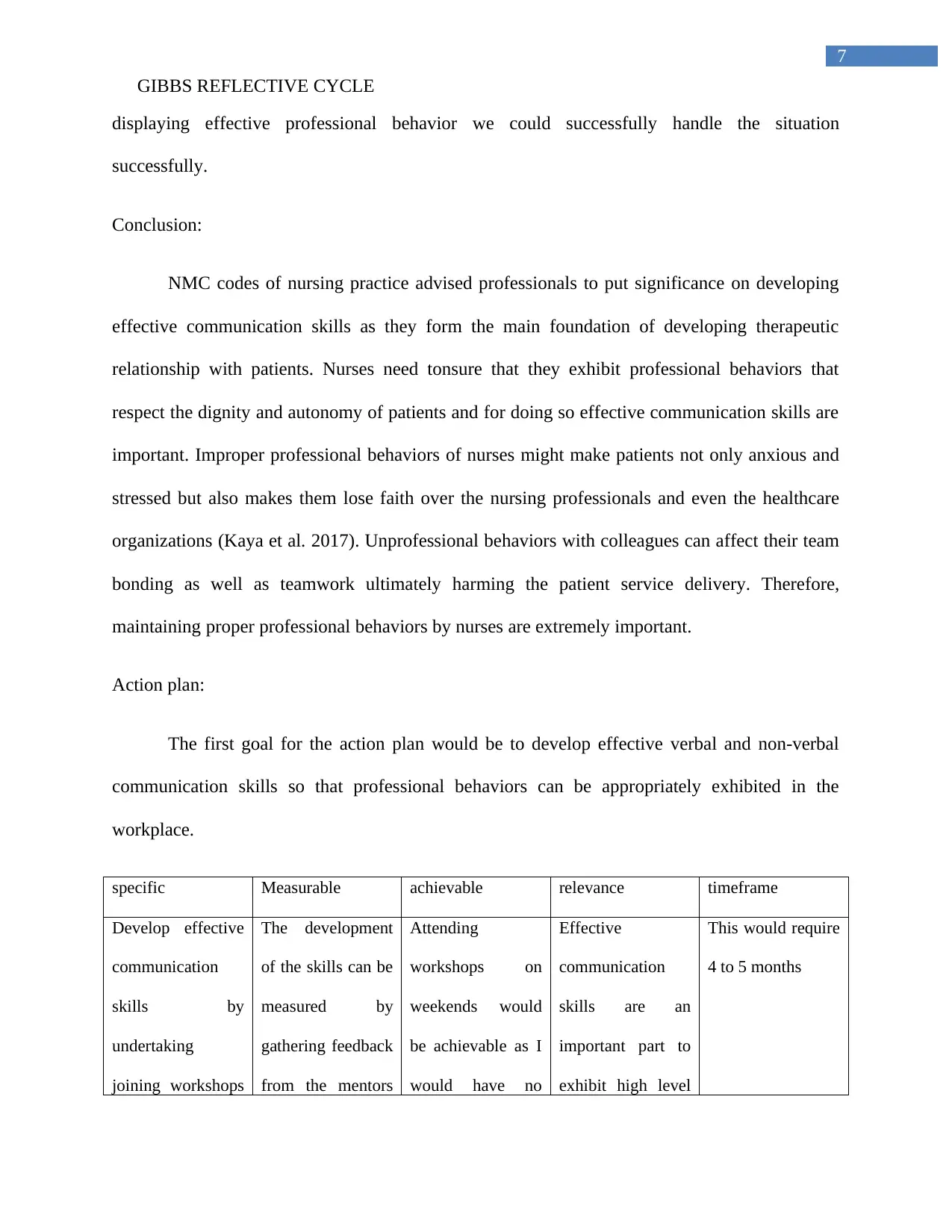
7
GIBBS REFLECTIVE CYCLE
displaying effective professional behavior we could successfully handle the situation
successfully.
Conclusion:
NMC codes of nursing practice advised professionals to put significance on developing
effective communication skills as they form the main foundation of developing therapeutic
relationship with patients. Nurses need tonsure that they exhibit professional behaviors that
respect the dignity and autonomy of patients and for doing so effective communication skills are
important. Improper professional behaviors of nurses might make patients not only anxious and
stressed but also makes them lose faith over the nursing professionals and even the healthcare
organizations (Kaya et al. 2017). Unprofessional behaviors with colleagues can affect their team
bonding as well as teamwork ultimately harming the patient service delivery. Therefore,
maintaining proper professional behaviors by nurses are extremely important.
Action plan:
The first goal for the action plan would be to develop effective verbal and non-verbal
communication skills so that professional behaviors can be appropriately exhibited in the
workplace.
specific Measurable achievable relevance timeframe
Develop effective
communication
skills by
undertaking
joining workshops
The development
of the skills can be
measured by
gathering feedback
from the mentors
Attending
workshops on
weekends would
be achievable as I
would have no
Effective
communication
skills are an
important part to
exhibit high level
This would require
4 to 5 months
GIBBS REFLECTIVE CYCLE
displaying effective professional behavior we could successfully handle the situation
successfully.
Conclusion:
NMC codes of nursing practice advised professionals to put significance on developing
effective communication skills as they form the main foundation of developing therapeutic
relationship with patients. Nurses need tonsure that they exhibit professional behaviors that
respect the dignity and autonomy of patients and for doing so effective communication skills are
important. Improper professional behaviors of nurses might make patients not only anxious and
stressed but also makes them lose faith over the nursing professionals and even the healthcare
organizations (Kaya et al. 2017). Unprofessional behaviors with colleagues can affect their team
bonding as well as teamwork ultimately harming the patient service delivery. Therefore,
maintaining proper professional behaviors by nurses are extremely important.
Action plan:
The first goal for the action plan would be to develop effective verbal and non-verbal
communication skills so that professional behaviors can be appropriately exhibited in the
workplace.
specific Measurable achievable relevance timeframe
Develop effective
communication
skills by
undertaking
joining workshops
The development
of the skills can be
measured by
gathering feedback
from the mentors
Attending
workshops on
weekends would
be achievable as I
would have no
Effective
communication
skills are an
important part to
exhibit high level
This would require
4 to 5 months
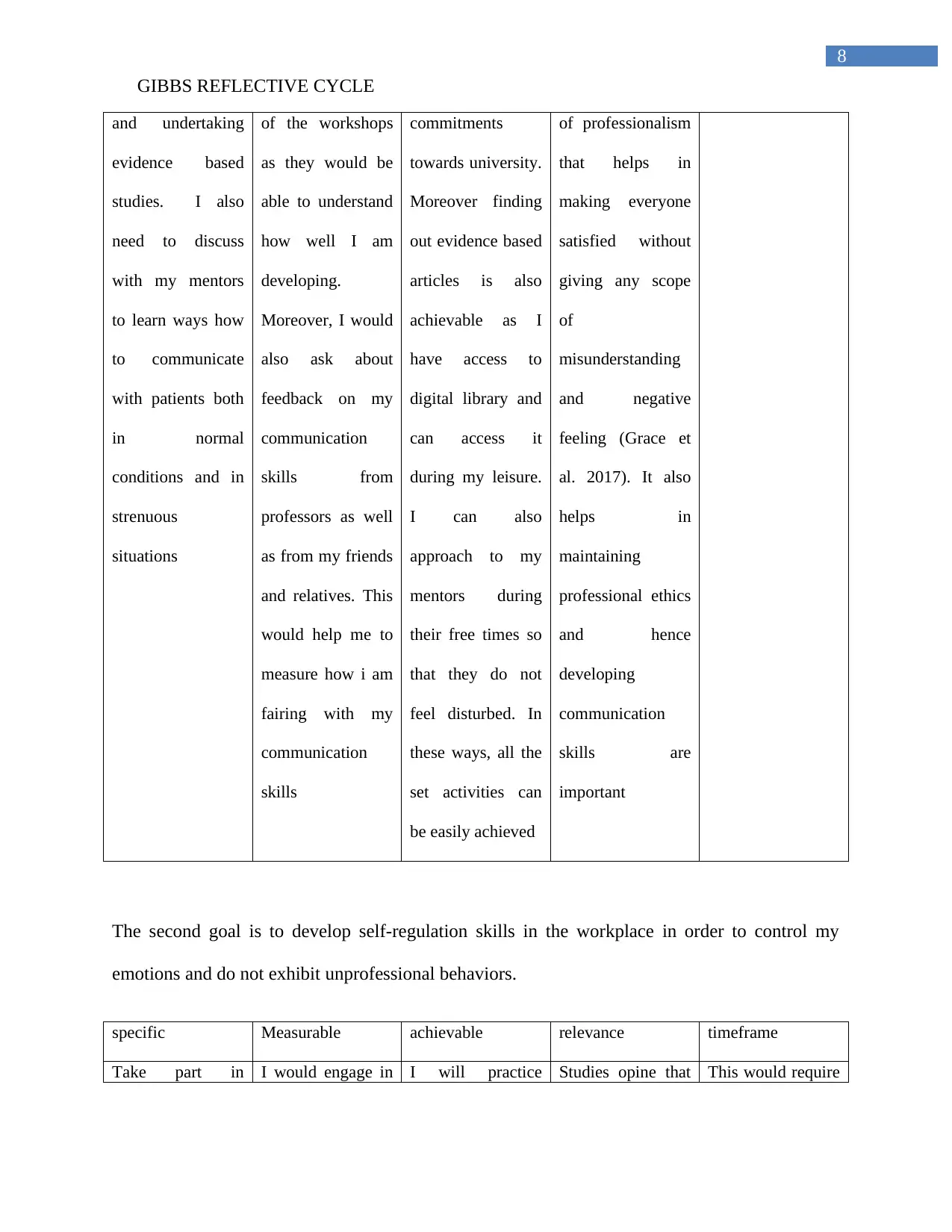
8
GIBBS REFLECTIVE CYCLE
and undertaking
evidence based
studies. I also
need to discuss
with my mentors
to learn ways how
to communicate
with patients both
in normal
conditions and in
strenuous
situations
of the workshops
as they would be
able to understand
how well I am
developing.
Moreover, I would
also ask about
feedback on my
communication
skills from
professors as well
as from my friends
and relatives. This
would help me to
measure how i am
fairing with my
communication
skills
commitments
towards university.
Moreover finding
out evidence based
articles is also
achievable as I
have access to
digital library and
can access it
during my leisure.
I can also
approach to my
mentors during
their free times so
that they do not
feel disturbed. In
these ways, all the
set activities can
be easily achieved
of professionalism
that helps in
making everyone
satisfied without
giving any scope
of
misunderstanding
and negative
feeling (Grace et
al. 2017). It also
helps in
maintaining
professional ethics
and hence
developing
communication
skills are
important
The second goal is to develop self-regulation skills in the workplace in order to control my
emotions and do not exhibit unprofessional behaviors.
specific Measurable achievable relevance timeframe
Take part in I would engage in I will practice Studies opine that This would require
GIBBS REFLECTIVE CYCLE
and undertaking
evidence based
studies. I also
need to discuss
with my mentors
to learn ways how
to communicate
with patients both
in normal
conditions and in
strenuous
situations
of the workshops
as they would be
able to understand
how well I am
developing.
Moreover, I would
also ask about
feedback on my
communication
skills from
professors as well
as from my friends
and relatives. This
would help me to
measure how i am
fairing with my
communication
skills
commitments
towards university.
Moreover finding
out evidence based
articles is also
achievable as I
have access to
digital library and
can access it
during my leisure.
I can also
approach to my
mentors during
their free times so
that they do not
feel disturbed. In
these ways, all the
set activities can
be easily achieved
of professionalism
that helps in
making everyone
satisfied without
giving any scope
of
misunderstanding
and negative
feeling (Grace et
al. 2017). It also
helps in
maintaining
professional ethics
and hence
developing
communication
skills are
important
The second goal is to develop self-regulation skills in the workplace in order to control my
emotions and do not exhibit unprofessional behaviors.
specific Measurable achievable relevance timeframe
Take part in I would engage in I will practice Studies opine that This would require
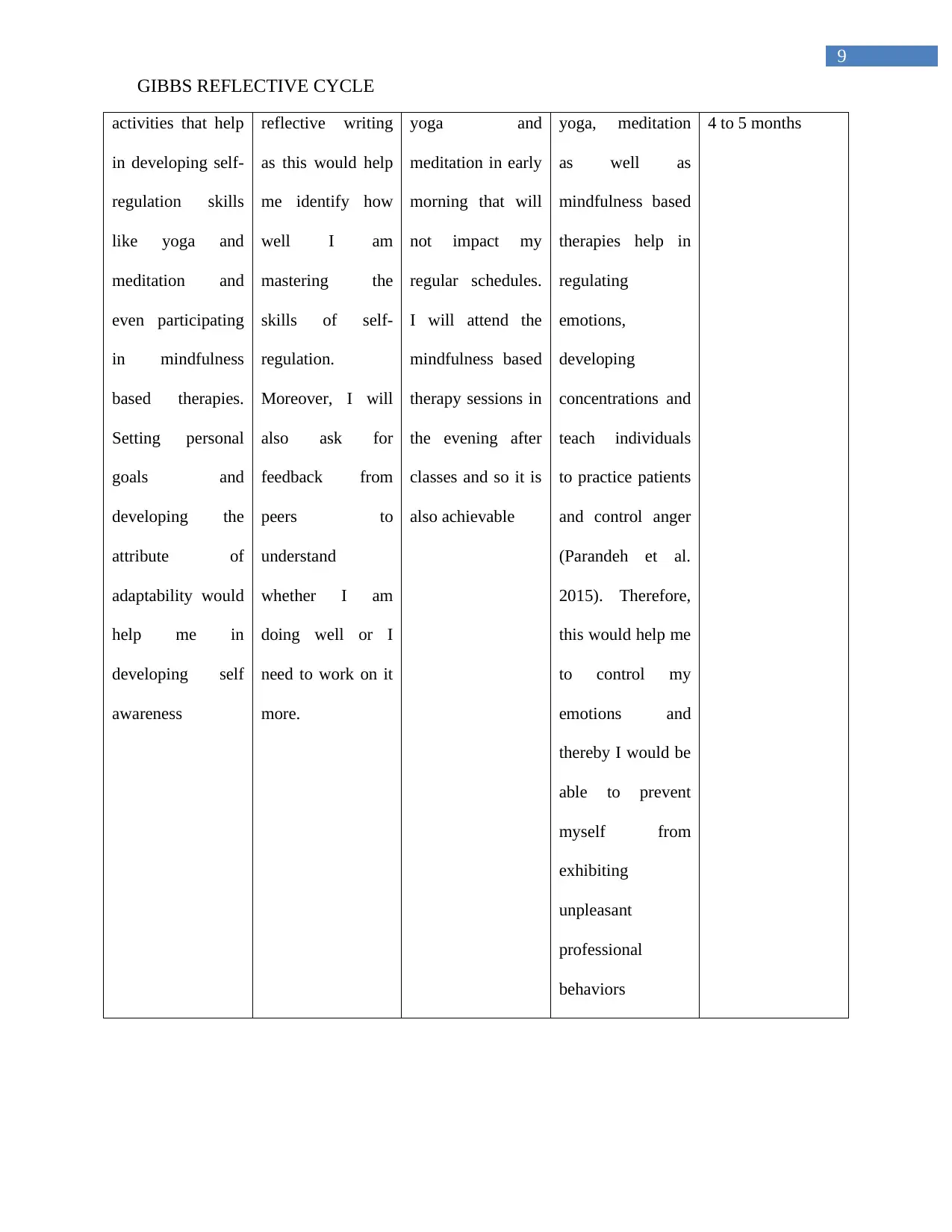
9
GIBBS REFLECTIVE CYCLE
activities that help
in developing self-
regulation skills
like yoga and
meditation and
even participating
in mindfulness
based therapies.
Setting personal
goals and
developing the
attribute of
adaptability would
help me in
developing self
awareness
reflective writing
as this would help
me identify how
well I am
mastering the
skills of self-
regulation.
Moreover, I will
also ask for
feedback from
peers to
understand
whether I am
doing well or I
need to work on it
more.
yoga and
meditation in early
morning that will
not impact my
regular schedules.
I will attend the
mindfulness based
therapy sessions in
the evening after
classes and so it is
also achievable
yoga, meditation
as well as
mindfulness based
therapies help in
regulating
emotions,
developing
concentrations and
teach individuals
to practice patients
and control anger
(Parandeh et al.
2015). Therefore,
this would help me
to control my
emotions and
thereby I would be
able to prevent
myself from
exhibiting
unpleasant
professional
behaviors
4 to 5 months
GIBBS REFLECTIVE CYCLE
activities that help
in developing self-
regulation skills
like yoga and
meditation and
even participating
in mindfulness
based therapies.
Setting personal
goals and
developing the
attribute of
adaptability would
help me in
developing self
awareness
reflective writing
as this would help
me identify how
well I am
mastering the
skills of self-
regulation.
Moreover, I will
also ask for
feedback from
peers to
understand
whether I am
doing well or I
need to work on it
more.
yoga and
meditation in early
morning that will
not impact my
regular schedules.
I will attend the
mindfulness based
therapy sessions in
the evening after
classes and so it is
also achievable
yoga, meditation
as well as
mindfulness based
therapies help in
regulating
emotions,
developing
concentrations and
teach individuals
to practice patients
and control anger
(Parandeh et al.
2015). Therefore,
this would help me
to control my
emotions and
thereby I would be
able to prevent
myself from
exhibiting
unpleasant
professional
behaviors
4 to 5 months
Secure Best Marks with AI Grader
Need help grading? Try our AI Grader for instant feedback on your assignments.
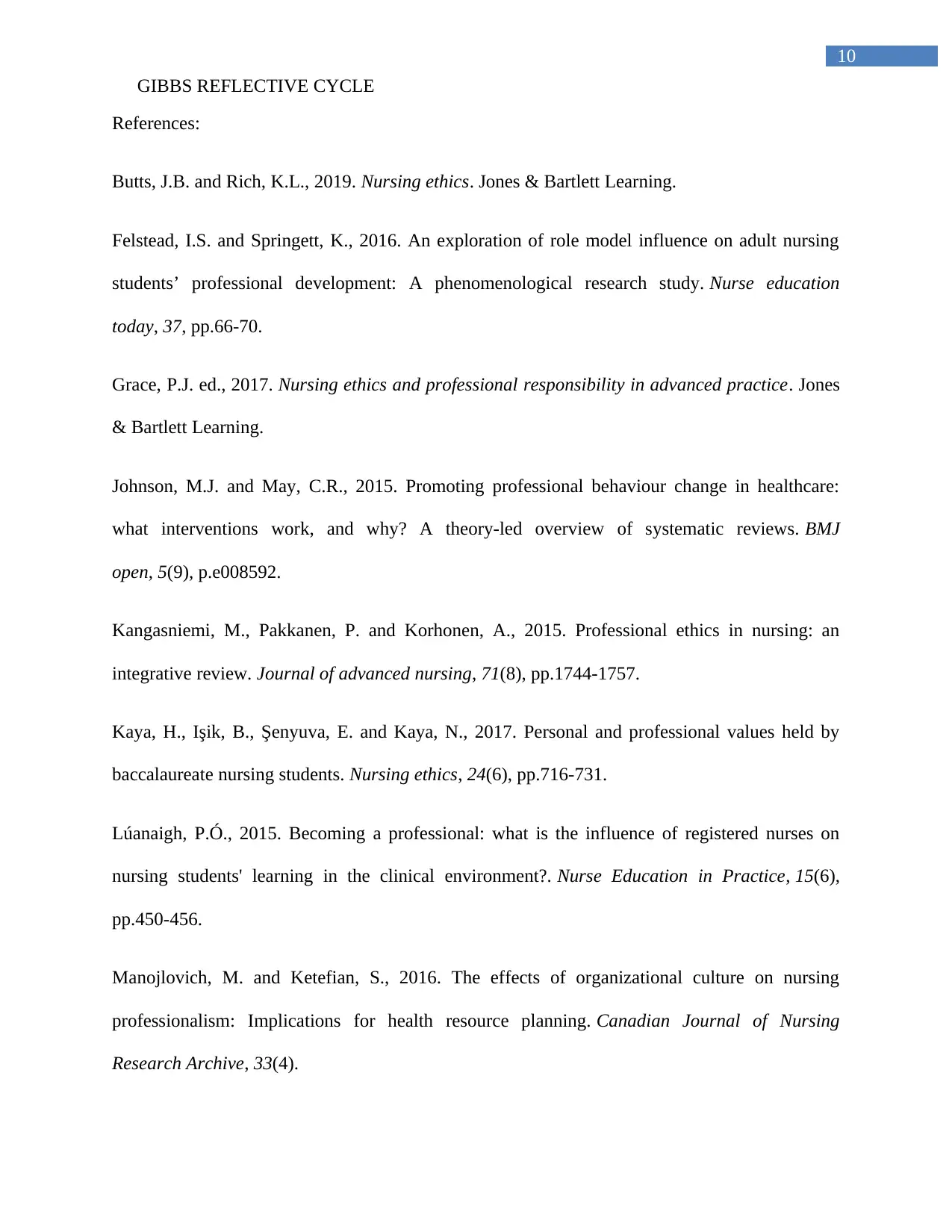
10
GIBBS REFLECTIVE CYCLE
References:
Butts, J.B. and Rich, K.L., 2019. Nursing ethics. Jones & Bartlett Learning.
Felstead, I.S. and Springett, K., 2016. An exploration of role model influence on adult nursing
students’ professional development: A phenomenological research study. Nurse education
today, 37, pp.66-70.
Grace, P.J. ed., 2017. Nursing ethics and professional responsibility in advanced practice. Jones
& Bartlett Learning.
Johnson, M.J. and May, C.R., 2015. Promoting professional behaviour change in healthcare:
what interventions work, and why? A theory-led overview of systematic reviews. BMJ
open, 5(9), p.e008592.
Kangasniemi, M., Pakkanen, P. and Korhonen, A., 2015. Professional ethics in nursing: an
integrative review. Journal of advanced nursing, 71(8), pp.1744-1757.
Kaya, H., Işik, B., Şenyuva, E. and Kaya, N., 2017. Personal and professional values held by
baccalaureate nursing students. Nursing ethics, 24(6), pp.716-731.
Lúanaigh, P.Ó., 2015. Becoming a professional: what is the influence of registered nurses on
nursing students' learning in the clinical environment?. Nurse Education in Practice, 15(6),
pp.450-456.
Manojlovich, M. and Ketefian, S., 2016. The effects of organizational culture on nursing
professionalism: Implications for health resource planning. Canadian Journal of Nursing
Research Archive, 33(4).
GIBBS REFLECTIVE CYCLE
References:
Butts, J.B. and Rich, K.L., 2019. Nursing ethics. Jones & Bartlett Learning.
Felstead, I.S. and Springett, K., 2016. An exploration of role model influence on adult nursing
students’ professional development: A phenomenological research study. Nurse education
today, 37, pp.66-70.
Grace, P.J. ed., 2017. Nursing ethics and professional responsibility in advanced practice. Jones
& Bartlett Learning.
Johnson, M.J. and May, C.R., 2015. Promoting professional behaviour change in healthcare:
what interventions work, and why? A theory-led overview of systematic reviews. BMJ
open, 5(9), p.e008592.
Kangasniemi, M., Pakkanen, P. and Korhonen, A., 2015. Professional ethics in nursing: an
integrative review. Journal of advanced nursing, 71(8), pp.1744-1757.
Kaya, H., Işik, B., Şenyuva, E. and Kaya, N., 2017. Personal and professional values held by
baccalaureate nursing students. Nursing ethics, 24(6), pp.716-731.
Lúanaigh, P.Ó., 2015. Becoming a professional: what is the influence of registered nurses on
nursing students' learning in the clinical environment?. Nurse Education in Practice, 15(6),
pp.450-456.
Manojlovich, M. and Ketefian, S., 2016. The effects of organizational culture on nursing
professionalism: Implications for health resource planning. Canadian Journal of Nursing
Research Archive, 33(4).
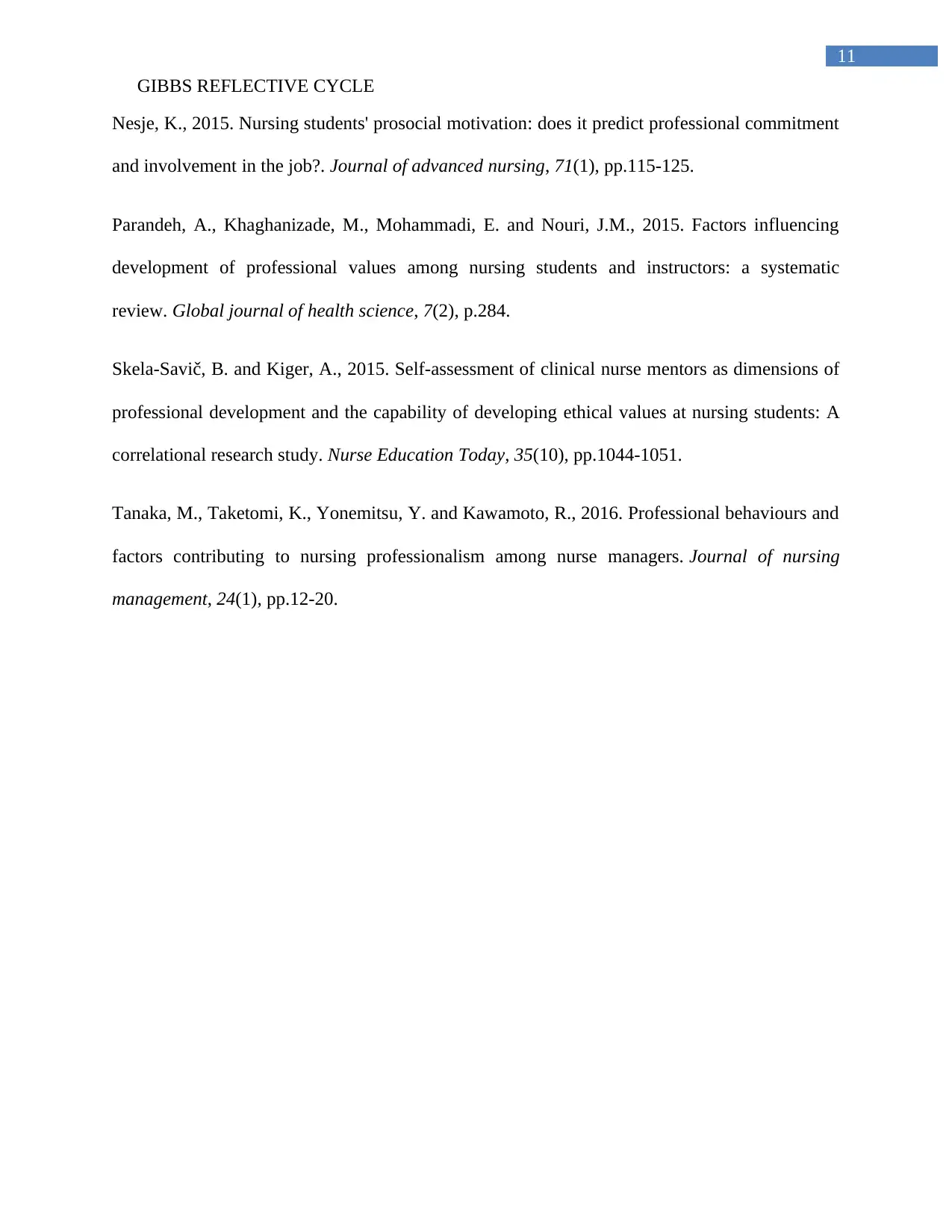
11
GIBBS REFLECTIVE CYCLE
Nesje, K., 2015. Nursing students' prosocial motivation: does it predict professional commitment
and involvement in the job?. Journal of advanced nursing, 71(1), pp.115-125.
Parandeh, A., Khaghanizade, M., Mohammadi, E. and Nouri, J.M., 2015. Factors influencing
development of professional values among nursing students and instructors: a systematic
review. Global journal of health science, 7(2), p.284.
Skela-Savič, B. and Kiger, A., 2015. Self-assessment of clinical nurse mentors as dimensions of
professional development and the capability of developing ethical values at nursing students: A
correlational research study. Nurse Education Today, 35(10), pp.1044-1051.
Tanaka, M., Taketomi, K., Yonemitsu, Y. and Kawamoto, R., 2016. Professional behaviours and
factors contributing to nursing professionalism among nurse managers. Journal of nursing
management, 24(1), pp.12-20.
GIBBS REFLECTIVE CYCLE
Nesje, K., 2015. Nursing students' prosocial motivation: does it predict professional commitment
and involvement in the job?. Journal of advanced nursing, 71(1), pp.115-125.
Parandeh, A., Khaghanizade, M., Mohammadi, E. and Nouri, J.M., 2015. Factors influencing
development of professional values among nursing students and instructors: a systematic
review. Global journal of health science, 7(2), p.284.
Skela-Savič, B. and Kiger, A., 2015. Self-assessment of clinical nurse mentors as dimensions of
professional development and the capability of developing ethical values at nursing students: A
correlational research study. Nurse Education Today, 35(10), pp.1044-1051.
Tanaka, M., Taketomi, K., Yonemitsu, Y. and Kawamoto, R., 2016. Professional behaviours and
factors contributing to nursing professionalism among nurse managers. Journal of nursing
management, 24(1), pp.12-20.
1 out of 12
Related Documents
Your All-in-One AI-Powered Toolkit for Academic Success.
+13062052269
info@desklib.com
Available 24*7 on WhatsApp / Email
![[object Object]](/_next/static/media/star-bottom.7253800d.svg)
Unlock your academic potential
© 2024 | Zucol Services PVT LTD | All rights reserved.





